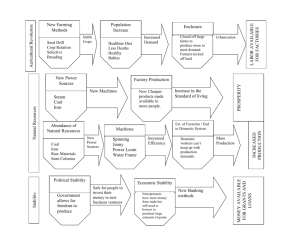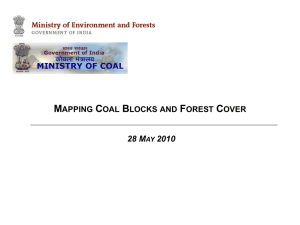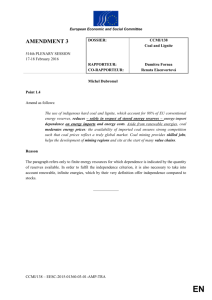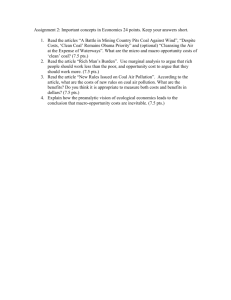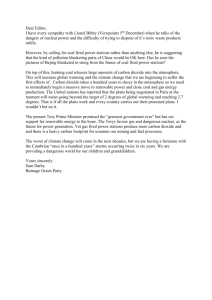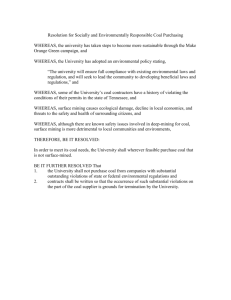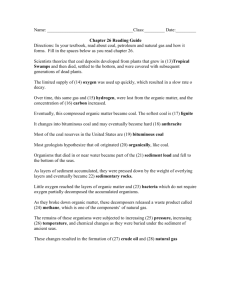Tony Wrigley interviewed by Alan Macfarlane, 23rd July 2007 0:07
advertisement
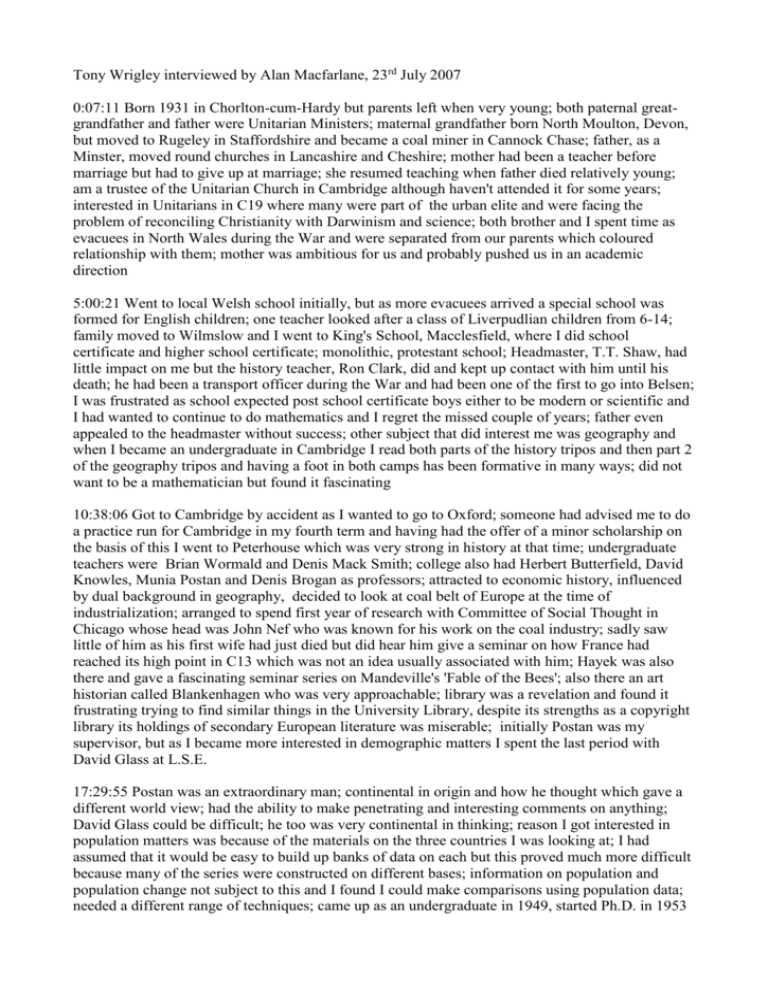
Tony Wrigley interviewed by Alan Macfarlane, 23rd July 2007 0:07:11 Born 1931 in Chorlton-cum-Hardy but parents left when very young; both paternal greatgrandfather and father were Unitarian Ministers; maternal grandfather born North Moulton, Devon, but moved to Rugeley in Staffordshire and became a coal miner in Cannock Chase; father, as a Minster, moved round churches in Lancashire and Cheshire; mother had been a teacher before marriage but had to give up at marriage; she resumed teaching when father died relatively young; am a trustee of the Unitarian Church in Cambridge although haven't attended it for some years; interested in Unitarians in C19 where many were part of the urban elite and were facing the problem of reconciling Christianity with Darwinism and science; both brother and I spent time as evacuees in North Wales during the War and were separated from our parents which coloured relationship with them; mother was ambitious for us and probably pushed us in an academic direction 5:00:21 Went to local Welsh school initially, but as more evacuees arrived a special school was formed for English children; one teacher looked after a class of Liverpudlian children from 6-14; family moved to Wilmslow and I went to King's School, Macclesfield, where I did school certificate and higher school certificate; monolithic, protestant school; Headmaster, T.T. Shaw, had little impact on me but the history teacher, Ron Clark, did and kept up contact with him until his death; he had been a transport officer during the War and had been one of the first to go into Belsen; I was frustrated as school expected post school certificate boys either to be modern or scientific and I had wanted to continue to do mathematics and I regret the missed couple of years; father even appealed to the headmaster without success; other subject that did interest me was geography and when I became an undergraduate in Cambridge I read both parts of the history tripos and then part 2 of the geography tripos and having a foot in both camps has been formative in many ways; did not want to be a mathematician but found it fascinating 10:38:06 Got to Cambridge by accident as I wanted to go to Oxford; someone had advised me to do a practice run for Cambridge in my fourth term and having had the offer of a minor scholarship on the basis of this I went to Peterhouse which was very strong in history at that time; undergraduate teachers were Brian Wormald and Denis Mack Smith; college also had Herbert Butterfield, David Knowles, Munia Postan and Denis Brogan as professors; attracted to economic history, influenced by dual background in geography, decided to look at coal belt of Europe at the time of industrialization; arranged to spend first year of research with Committee of Social Thought in Chicago whose head was John Nef who was known for his work on the coal industry; sadly saw little of him as his first wife had just died but did hear him give a seminar on how France had reached its high point in C13 which was not an idea usually associated with him; Hayek was also there and gave a fascinating seminar series on Mandeville's 'Fable of the Bees'; also there an art historian called Blankenhagen who was very approachable; library was a revelation and found it frustrating trying to find similar things in the University Library, despite its strengths as a copyright library its holdings of secondary European literature was miserable; initially Postan was my supervisor, but as I became more interested in demographic matters I spent the last period with David Glass at L.S.E. 17:29:55 Postan was an extraordinary man; continental in origin and how he thought which gave a different world view; had the ability to make penetrating and interesting comments on anything; David Glass could be difficult; he too was very continental in thinking; reason I got interested in population matters was because of the materials on the three countries I was looking at; I had assumed that it would be easy to build up banks of data on each but this proved much more difficult because many of the series were constructed on different bases; information on population and population change not subject to this and I found I could make comparisons using population data; needed a different range of techniques; came up as an undergraduate in 1949, started Ph.D. in 1953 and finished in 1957 21:00:00 Thesis showed very clearly that Belgium was the quickest to adopt technical innovations from England so in 1830-40's Belgium coal, steel and manufacture production was in advance of the other areas; by the end of the C19 the course of development showed that the differences were much to do with the quality of the coal resources in the different areas; Ruhr had massive advantages that would have shown through independent of political divisions; to understand the development of the area as a whole you could do so largely by ignoring national differences; varying development of coal resources partly geological; steam engines; concealed coal fields; absence of coal production will prohibit industrial development, as is did in China; particular features which led England to be first industrial society; income levels have to be high to lead to demand for manufactured products; prior to Industrial Revolution agriculture the largest producer so needed to increase output per head there which will increase real income and reduce labour; in England the feedback between agricultural efficiency and growth of cities which occurred from C16 to C18 did create situation whereby half the male labour force was not working on the land by 1750; in other comparable economies the proportion on the land was around 80% or more; rapid growth of London encouraged agricultural efficiency; fortunate to have access to coal and increasing demand for heat energy then there is the possibility for the changes that then took place; recently, a group of collaborators have been trying to chart the energy use in the coal belt countries; shows that before end of C16 more than half of energy in England came from coal, a situation not reached elsewhere in Europe until the end of the C19; breakthrough when heat energy in coal can be used to drive machines; productive power of individuals greatly changed; sun energy very great but can only be transformed by photosynthesis which is very inefficient; thus quantity of energy in any organic economy is very tiny; only way is to tap fossil fuels; work of de Vries and Van de Woude 'The First Modern Economy' 34:36:03 Role of animals in productive agriculture; rice and potato production means not dependent on draught animals but wheat and barley production is; England had pastures because population not too dense; rotation agriculture and use of clover and lucerne; well fed animals reach maturity faster so also more meat per animal 40:11:10 After Ph.D. became an assistant lecturer in the Geography Department in Cambridge in 1957 and stayed as a lecturer there until the middle 1970's; elected as Fellow at Peterhouse and spent ten years as Bursar there from 1964-74 which I thoroughly enjoyed; instructive, particularly visiting college farms; farmers reasons for renting rather than owning land because it frees capital; very different from peasant agriculture where owning is desired; with Peter Laslett founded the Cambridge Group for Population and Social Structure in 1964 and was then paid as a director by the S.S.R.C. for much of the 1970's; phoned by Ralf Darendorf while on sabbatical in Holland in 1979 with invitation to head a demographic unit at L.S.E. after Glass's death; did this for nine years which I enjoyed; two of my first appointments, Mike Murphy and Tim Dyson, are now Fellows of the British Academy; very good teaching programme centring on Master's degree; many foreign students boosted by Thatcherite cuts which meant L.S.E. lost income from home student from 80% to 40%; affected by international money rates as student came here when pound low and went elsewhere when high 46:03:05 At the Cambridge Group got involved in family reconstitution, a technique for connecting up the series of vital events in anyone's life to enable one to construct family histories; Swedish scholars were practising this early in the C20 but the key technical development of Louis Henry in France was to refine it; he was recruited to INED (Institut National d'Etudes Démographiques ) by Alfred Sauvy and deputed to look into the fundamental characteristics of human fertility; frustrated by variety of national censuses and statistics; came across work done on the bourgeoisie of Geneva which gave him the possibility of studying the characteristics of fertility; found they were a group early into family limitation by the middle C17 and he still wanted more data; turned to French parish registers to see if it was possible to create the same thing for whole communities; I found his work interesting and wanted to see if it was possible to parallel his work using English parish registers; David Glass had concluded that it was not possible as the English records were not sufficiently detailed; I tried this with Colyton for its continuous registration, some periods of great detail but some not; wanted to test what was the break-even point where the data would not be full of holes; Peter Laslett came into it from a different angle, through his work on Robert Filmer, wondering whether Filmer's ideas on patriarchy were reflected in familial organization at the time; found in listings of Clayworth and Coggenhoe, two places in England where he could examine this with some precision and discovered the persistence of the nuclear family; we jointly felt that the weakness of INED was that the work was technically excellent but they were largely indifferent to historical issues and others in France, such as Goubert, on Beauvais and Beauvaisis, were very interested in history but not so good demographically; we hoped to produce a fusion of the two strands 52:48:04 First came across Peter as an undergraduate when he taught me in my third year; we never collaborated on a project but got intellectual feedback from each other; the Group provided an ideal forum in which this could continue; developed a library of relevant papers, including conference papers and ephemera; Roger Schofield joined early; he developed an interest in history of literacy; when I left L.S.E. in 1988 I went to All Souls, Roger then took over as Director until he in turn was replaced by Richard Smith 56:20:15 Later became Master of Corpus Christi; I would have regretted not doing it but not unalloyed pleasure; also President of the British Academy which I thoroughly enjoyed; important source of grants for scholars; research councils tend to give very large grants in blocks whereas British Academy very useful for smaller grants; its research fellowship scheme also hugely successful; increasingly a voice for social sciences and humanities; now researching jointly with Leigh Shaw Taylor doing a reconstruction of the changing occupational structure of this country, initially from 1750-1850 but extending forward and back in time; finding further back that patterns that we regard as being characteristic of the Industrial Revolution had already appeared by the middle of the C18

